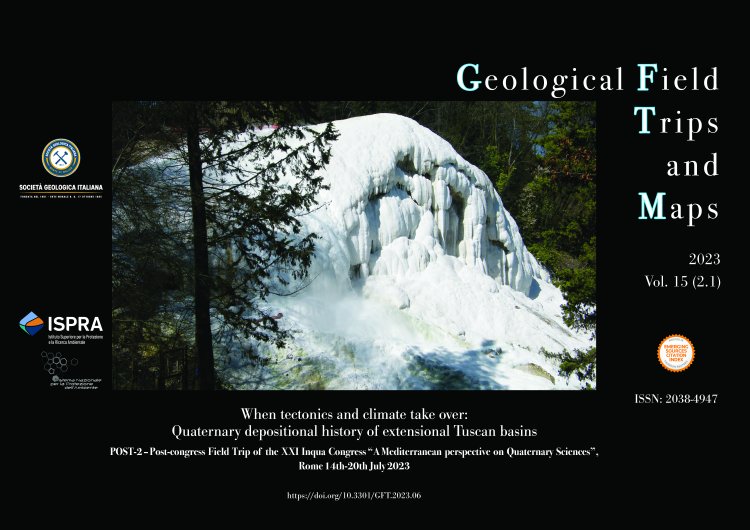
Volume 15 (2.1)/2023
When tectonics and climate take over: Quaternary depositional history of extensional Tuscan basins
POST-2 – Post-congress Field Trip of the XXI Inqua Congress "A Mediterranean perspective on Quaternary Sciences", Rome 14th-20th July 2023
DOI: https://doi.org/10.3301/GFT.2023.06 - Pages: 1-60
Adele Bertini1, Andrea Brogi2 & Enrico Capezzuoli1
1Dipartimento di Scienze della Terra – Università degli Studi di Firenze, Via G. La Pira 4 – 50121 Firenze (Italy).
2Dipartimento di Scienze della Terra e Geoambientali – Università degli Studi di Bari, Via Orabona, 4 – 70125 Bari (Italy).
Corresponding author e-mail: adele.bertini@unifi.it
2Dipartimento di Scienze della Terra e Geoambientali – Università degli Studi di Bari, Via Orabona, 4 – 70125 Bari (Italy).
Corresponding author e-mail: adele.bertini@unifi.it
Abstract
The investigation of the tectono-sedimentary evolution of the extensional basins of southern Tuscany plays a key-role to understand the settings into which sediments are deposited in response to the interaction among eustatism, climate and tectonic activity. Indeed, during the Quaternary, the extensional basins of southern Tuscany hosted thick successions of continental and marine sediments whose deposition was strongly controlled by tectonic activity, volcanic and climatic processes. In this view, such basins can unveil detailed records of Quaternary climatic changes and tectonic processes leading to significant changes of this portion of the Apennine belt. Spectacular examples of this interaction, occurred during the last 3 Ma, will be illustrated in different depositional settings: marine - Radicofani Basin; fluvio/lacustrine - Valdarno Basin; volcanic - Monte Amiata Volcano and Radicofani; travertines - Rapolano Terme and Bagni San Filippo. The field trip is nestled in the historical and scenic view of the Tuscan landscape.
Keywords
tectonics, climate, sedimentary successions, terrestrial carbonates, sedimentology, palynology, Northern Apennines, glacial/interglacial cycles, UBSU.
